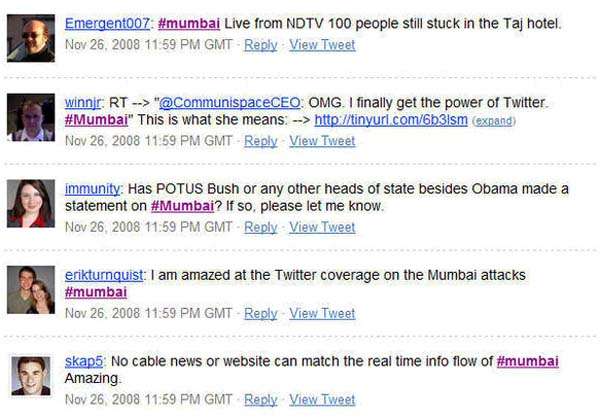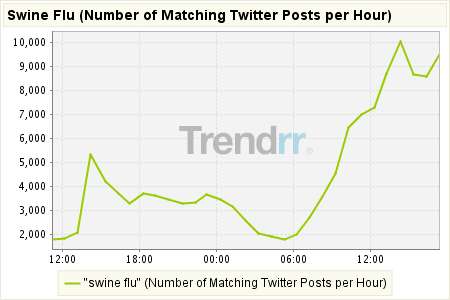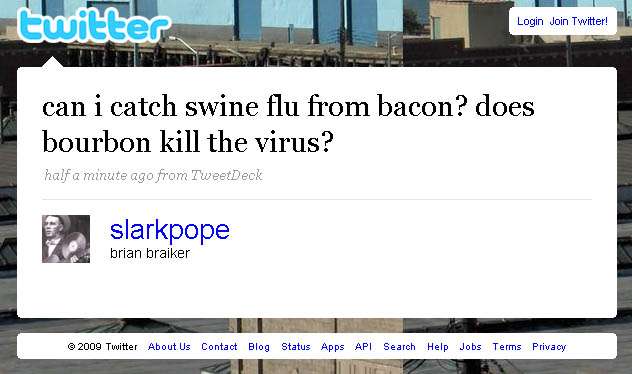Chris Bennett, Twitter, the Most Important Website Since Google?
I've played with twitter some and its fun to use the search feature that he describes and see what is being "tweeted" about different subjects, but I really thought this guy Bennett was overstating his case, which is pretty much summarized in this excerpt:
Anything I need to know about something that is happening right now or has happened in the last 12 hours I use Twitter search for. I used to search through Google Blogsearch, Digg, Delicious, Youtube to get breaking news but now I am alerted to it so quick through someones update, and I can go to Twitter search and get hundreds if not thousands of snippets of info and links seconds/minutes after it is happening.(He used to search YouTube for breaking news?)
One of the examples he gives is the use of Twitter during the bombings and attacks on the Taj Mahal hotel and other locations in Mubai, India last November. The link in his article leads to the image here:

which is a screen capture of, apparently, five typical tweets during the attacks. But three are comments
This article:
UPDATED: Terror Attacks in Mumbai: Mobiles and Twitter play Key Role in 24/7 Reporting
goes into better detail about the use of Twitter and cellphones during the Mumbai attacks by people who were actually IN Mumbai, but it seems the more important updates were from people who - no surprise, really - used their cell phones to actually call and talk to people rather than tweeting out 140-character messages. (I don't think even your typical twelve-year old can text faster than he can talk, right?)
What Twitter doesn't have - at least as far as I can tell - is some review/evaluation function - so how is Twitter keeping spammers out? Or the fakers? Or the trolls? Apparently, the better posts are "re-tweeted" and that can lend some weight and help the important tweets "rise" to the top. But you really need to use other tools and sites to help shuffle and sort through whats being tweeted about the latest hot topic unless you just want to read the raw feed and catch whatever stories are at the top of the screen when you refresh your search.
(On of the best tools I found is TwitterFall, which lets you search and sort tweets and watch them live without having to refresh the screen.)
Back to this guy's belief that Twitter is "the most important website" since Google (and that's a weird phrasing - I would say both are tools residing on websites and not JUST a websites themselves and, yes, maybe that's a weak distinction, but isn't Twitter essentially making your web browser a sort of news aggregator? I guess people stopped talking about "killer apps" long ago, but that, I think, is what this guy thinks Twitter might be). With the swine flu scare now dominating the news, it seems we have a big enough news story to test out the writer's ideas.
So I've been searching/monitoring Twitter for
"swine flu"
and/or the hash tag
#swineflu
as well as the "Trending Topic" of Swine Flu which is just a pre-configured search for
"Swine Flu" OR Flu
You have to refresh your browser screen after you search Twitter to see new tweets that match your search, but it does tell you how many new results match your query since your search or since your last re-fresh. There's been about 120-130 new results per minute all day today for the Trending Topic query above, by my roughing timing at a few points. This chart from whatever Trendrr is tracks this more precisely, showing hour-by-hour tweets about swine flu:

As the short article accompanying this graph says, this snowballing effect is apparently typical of any hot topic on Twitter and is completely separate from any actual development in a news story: tweets about tweets about the story contribute to the increase in total tweets on any given subject. (Now I DID find that chart from a tweet in my "swine flu" search; it was one of 700+ since I had last refreshed my twitter search results, and if it hadn't been in the top five I wouldn't have seen it. And it is, of course, a story about the Twittering over the swine flu story, and not actually about the swine flu threat itself.)
I would estimate that 85-90% of the swine flu tweets I saw today are just zero-content comments ("this swine flu is scary") or jokes; about 90% of the rest are links to the same handful of stories or web resources that people are more or less simultaneously discovering on news web sites or other places. At least a couple of dozens times I saw tweets leading to the same "live" google map tracking suspected and confirmed swine flu cases.
This cartoon was linked to multiple times (that I saw - so it was probably posted hundreds, or thousands of times today), as was this joke picture which typically had some TinyUrl or other shortcut link and was described as a serious news story about the origin of swine flu.
Yes, hahaha. As far as Twitter being the brilliant "live news" resource this article suggests, it falls way short. There are twenty-eight kids in some New York school who all have swine flu - why isn't one of them tweeting about their symptoms? Or one of their siblings?
Overall today, one of my favorites was this tweet:

(I don't know if that person was joking or seriously asking about this, but I intend to test his suggested cure at my first sniffle or hint of fever.)
Arguably, the repetition of news stories and resources does perform in a way as a filtering tool that helps get the most useful information - like the google map - get out to more people, but it also results in a lot of duplicate crap, like the cartoon and the picture.
As far as "authoritative" tweets, you can subscribe to Twitter accounts of official agencies and organizations, like the CDC, which has several Twitter accounts, including @CDCemergency. They've only had four tweets today, but one is a link to some official recommendations about drugs for treatment and/or prevention. They also have a tweet that leads to an audio recording of the conference call, in case anyone wants to listen to it later.
They're followed by a couple of dozen local Red Cross agencies and FEMA regional offices, and while this surely isn't the main means of communicating, I guess its good to have it as a backup.
I guess one way to frame the benefits of Twitter is that in lieu of watching a dozen news broadcasts and monitoring hundreds of web sites yourself, Twitter can aggregate what people are learning from all these resources into one place. But that's much different from what the author of that article said Twitter could do.
And that's NOT how the Mississippi Department of Transportation ("MSDOT") is set up to use Twitter for hurricane evacuations. This was reported a few weeks ago in several places.
One of the routines of evacuating for a hurricane (and returning after a near-miss) is listening to the local news broadcasts to find out where traffic is backed up and what alternate routes are available. That seems ready-made for Twitter, as its nearly impossible to get through to the radio stations if you've found an open two-lane back-road highway or if you want to notify other evacuees that the state troopers have closed a particular drawbridge. Tweeting this sort of information would be ideal, but MSDOT is just going to use Twitter like any other old-fashioned, one-way, top-down media: you can monitor one of the six MSDOT Twitter accounts, an account for all the main highways leading away from the coast, and get updates on how the traffic is flowing. BORING. They could just as easily use text message "blasts" or whatever for this. And the radio stations will be getting the information directly from MSDOT so I don't see an advantage to using your cell phones instead of your radio.
Now what would be REALLY useful is for Mississippi or Louisiana to set up twitter hash tags for the major routes and let evacuees tweet about what they've found on the road. Or just forget about the state DOTs - WWL and the other radio stations should be ready to promote this and encourage people to tweet about traffic conditions when they evacuate and then the on-air folks can monitor Twitter and broadcast what they're seeing people relay about traffic conditions. THAT's a killer app.




No comments:
Post a Comment